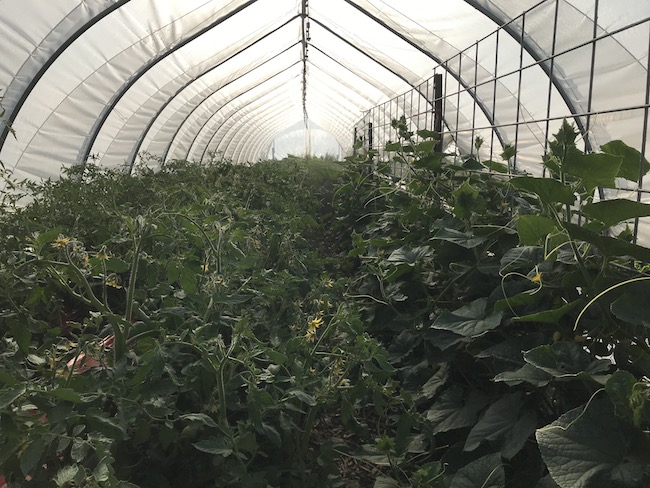
This spring, The FruitGuys Community Fund was able to award $53,471.96 in grants to 15 small farms and agricultural nonprofits across the United States. They’ve spent that time using their funding to work on a variety of sustainability projects that exemplify our mission, including creating community composting programs, building native pollinator habitats, integrating swales, and installing rainwater collection systems.
While our 2019 grantees had to overcome some intense challenges, we’re proud to say that they’ve all done incredible work. We believe the projects will have long-lasting impacts on their farms and communities, and we’re excited to share with you how their projects have progressed.
DoLittle Pastures
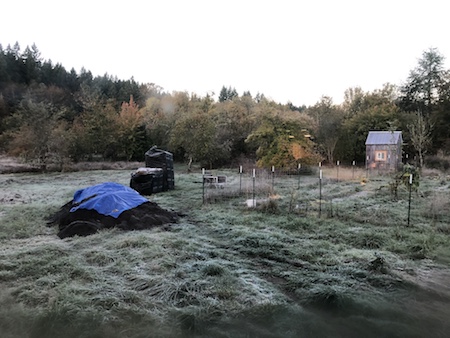 DoLittle Pastures, a 15-acre farm in Lacomb, OR, produces pastured meat and poultry, as well as woodland food and herbal products. They received $3,700 to purchase seeds, fruit trees, compost, and other supplies that have helped them create a sustainable food forest.
DoLittle Pastures, a 15-acre farm in Lacomb, OR, produces pastured meat and poultry, as well as woodland food and herbal products. They received $3,700 to purchase seeds, fruit trees, compost, and other supplies that have helped them create a sustainable food forest.
Co-owner Michelle Plata let us know that they’ve made great progress restoring the farm’s historic orchard. Over 100 fruit trees and plants have been added! They also amended the soil, cleared and re-seeded old pastures with native grasses and wildflowers, and added fencing. As Plata shared, “The orchard has continued to be a meeting place for Wildcrafting On Crabtree Creek. Recent projects have included making Hawthorn berry wine, elderberry syrup, and Oregon grape root tincture. On average, about 20 women and children participate each month.”
Wilderness Greenhouse
 Wilderness Greenhouse, a 1-acre farm near Homer, AK, produces tomatoes, cucumbers, fresh salsas, edible hanging baskets, and other seasonal vegetables. They received $2,135.62 to expand their water catchment system, purchase cover crop seeds, set up a vermicomposting system, and transition to Korean natural-farming methods.
Wilderness Greenhouse, a 1-acre farm near Homer, AK, produces tomatoes, cucumbers, fresh salsas, edible hanging baskets, and other seasonal vegetables. They received $2,135.62 to expand their water catchment system, purchase cover crop seeds, set up a vermicomposting system, and transition to Korean natural-farming methods.
They were able to install gutters on their greenhouse and two water storage tanks, allowing them to use collected water for drip irrigation all season, while saving them valuable time. Owner Tracy Veal also shared that their vermicompost system is all set up, and they’re expecting their first vermicompost harvest soon. Additionally, they were able to purchase season-extension materials and cover-crop seeds, which they used this fall. Veal told us, “We used season-extension materials to harvest later this year, but more importantly, we will be able to start earlier next year!”
Sankofa Farms LLC
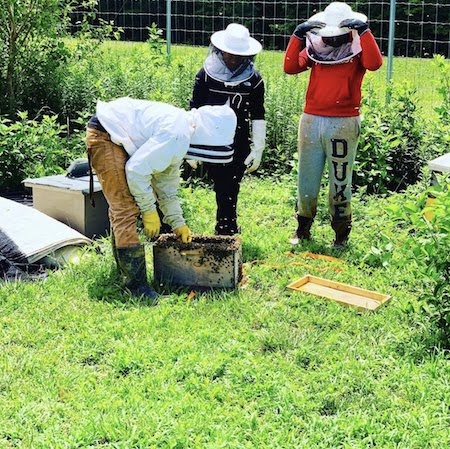 Sankofa Farms, a 2-acre farm in Cedar Grove, NC, produces vegetables, chicken, quail, and duck eggs, and seeks to create a sustainable food source for those living in both rural and urban parts of North Carolina. They also run a year-long agricultural program targeting at-risk black males in Durham/Orange County, NC, that focuses on regenerative agriculture, discipline, and communal responsibility. They received a $2,900.39 grant to increase their honeybee production and purchase a caterpillar tunnel and low-tunnel supplies.
Sankofa Farms, a 2-acre farm in Cedar Grove, NC, produces vegetables, chicken, quail, and duck eggs, and seeks to create a sustainable food source for those living in both rural and urban parts of North Carolina. They also run a year-long agricultural program targeting at-risk black males in Durham/Orange County, NC, that focuses on regenerative agriculture, discipline, and communal responsibility. They received a $2,900.39 grant to increase their honeybee production and purchase a caterpillar tunnel and low-tunnel supplies.
This season, Sankofa was able to purchase and install two beehives and a caterpillar tunnel. This increased their food production and community engagement. Both the beehives and caterpillar tunnel played key roles in educational programming throughout the summer. CEO Kamal Bell told us, “With the help of the grant, we served over 200 people, ranging from the ages of 12–60! People learned everything from beekeeping to how to properly plant in the caterpillar tunnels.”
Windswept Acres
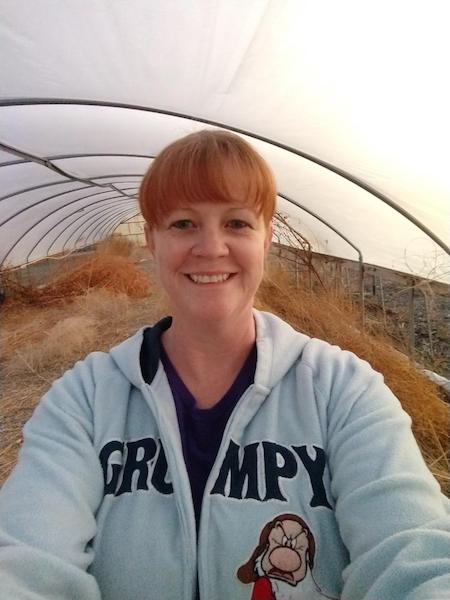 Windswept Acres, a veteran-owned 3-acre farm in Chino Valley, AZ, grows and pickles a variety of vegetables, which they sell at farmers markets. They received a $4,885.20 grant to complete two hoop houses to extend their growing season, plant pollinator-friendly perennials, and add beehives.
Windswept Acres, a veteran-owned 3-acre farm in Chino Valley, AZ, grows and pickles a variety of vegetables, which they sell at farmers markets. They received a $4,885.20 grant to complete two hoop houses to extend their growing season, plant pollinator-friendly perennials, and add beehives.
Despite struggling with family medical issues throughout the year, Windswept Acres was able to lay concrete footers and set up and cover a 90×20’ hoophouse. This will allow them to produce more food throughout the year. Owner Pamela Baker also told us about their exciting community outreach project, “We have the fresh-produce food bank in place at the American Legion Post 40, which will serve approximately 500 members on a limited income, so as soon as we have the produce available, we have an outlet ready and waiting.”
SweetRoot Farm LLC
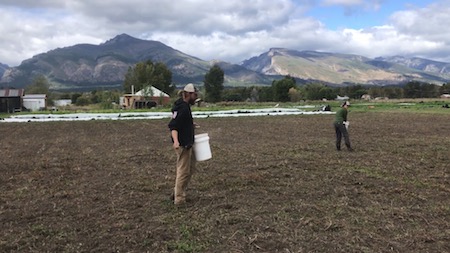 SweetRoot Farm is a 3-acre farm in Hamilton, MT, that produces eggs, along with a wide range of vegetables, herbs, flowers, and berries. They received a $2,288 grant to purchase cover crop seeds and sprinklers.
SweetRoot Farm is a 3-acre farm in Hamilton, MT, that produces eggs, along with a wide range of vegetables, herbs, flowers, and berries. They received a $2,288 grant to purchase cover crop seeds and sprinklers.
Co-owner Mary Bricker told us that they were able to plant two acres of cover crops and purchase irrigation equipment that will be used to water cover-cropped areas and a laying-hen pasture. Bricker said they expect to see increases in soil organic matter, soil condition, and plant-available nitrogen, adding, “We expect our soil tests next summer and fall to show the greatest impact.”
Scott Farm
 Scott Farm is a 40-acre farm in Dummerston, VT, that began cultivating in 1791. They grow heirloom fruit (mostly apples), which they sell at their farm market and to wholesale co-ops, markets, and distributors, including The FruitGuys! Scott Farm has been working toward transitioning from rented honeybee hives to native bees. They received a $2,211.54 grant to create six bee hotels and add pollinator plantings to their orchard.
Scott Farm is a 40-acre farm in Dummerston, VT, that began cultivating in 1791. They grow heirloom fruit (mostly apples), which they sell at their farm market and to wholesale co-ops, markets, and distributors, including The FruitGuys! Scott Farm has been working toward transitioning from rented honeybee hives to native bees. They received a $2,211.54 grant to create six bee hotels and add pollinator plantings to their orchard.
They used their grant to seed 50,000 square feet of pollinator plantings for native bees, build and install five large insect hotels, and add educational signage to their farm about the importance of native pollinators. Ali Stevenson, assistant orchard manager, told us, “The pollinator plantings buzzed with native bees, and the flowers had enough time to go to seed for next year. People were also much more interested in the project than we had hoped, so we had many more educational opportunities than we expected.”
La Semilla Community Farm
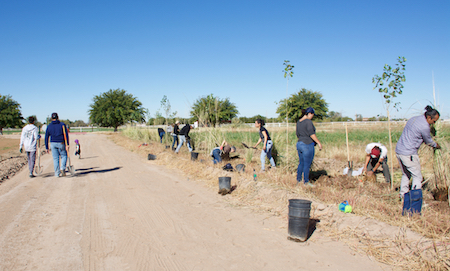 La Semilla Community Farm, a certified bee-friendly, nonprofit, 7-acre farm in Anthony, NM, produces vegetables, herbs, and honey. They received a $4,196 grant to purchase trees and plants for a native vegetation buffer and windbreak.
La Semilla Community Farm, a certified bee-friendly, nonprofit, 7-acre farm in Anthony, NM, produces vegetables, herbs, and honey. They received a $4,196 grant to purchase trees and plants for a native vegetation buffer and windbreak.
La Semilla was successful in planting their conservation buffer and windbreak. They planted 75 cottonwood trees and 135 bunches of alkali sacaton grass over 850 feet of their field. Farm Manager Jason Jasso said, “The windbreak will, with just a little bit of work and care, protect our farm from pesticide and herbicide drift and the effects of nearby soil erosion for years to come. It will provide important habitat for insects and birds and other wildlife, in a landscape that is increasingly fragmented by urban and rural development.”
Many Forks Farm
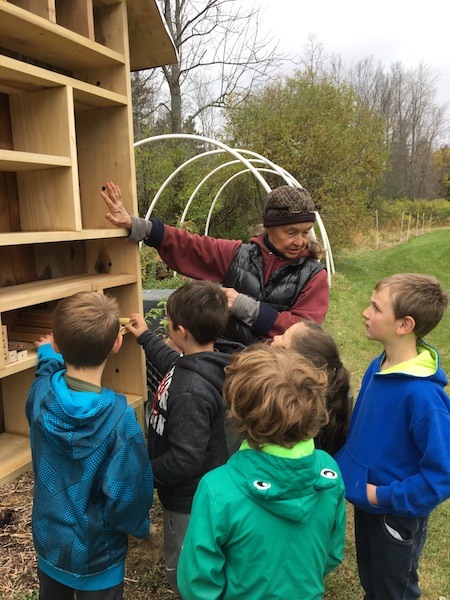 Many Forks Farm is a 7.5-acre farm in Massachusetts that produces vegetables, herbs, flowers, mushrooms, ginger, and berries, which are distributed through a CSA, farmers markets, Friendship Center Food Pantry, and the Berkshire Food Project free-lunch program. They received a $4,070 grant to create swales and berms planted with native perennials to improve drainage and provide habitat for beneficial insects.
Many Forks Farm is a 7.5-acre farm in Massachusetts that produces vegetables, herbs, flowers, mushrooms, ginger, and berries, which are distributed through a CSA, farmers markets, Friendship Center Food Pantry, and the Berkshire Food Project free-lunch program. They received a $4,070 grant to create swales and berms planted with native perennials to improve drainage and provide habitat for beneficial insects.
This season, they created berms and swales planted with native species and prepared areas for future insectary strips. Their new swales, berms, and plantings are working! Owner Sharon Wyrrick told us, “We had several substantial storms that would have usually flooded the sections that we mitigated as part of the project. They did not flood, nor even saturate, the newly planted areas.”
Fresh Roots Farm
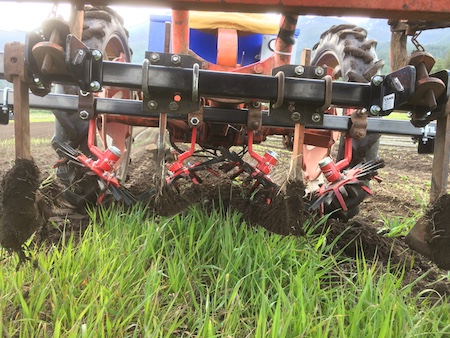 Fresh Roots Farm, a 5-acre farm in Polson, MT, produces certified organic vegetables, fruits, and seeds. They received a $3,725 grant to convert their Allis Chalmers G fossil-fuel tractor to 48v electric.
Fresh Roots Farm, a 5-acre farm in Polson, MT, produces certified organic vegetables, fruits, and seeds. They received a $3,725 grant to convert their Allis Chalmers G fossil-fuel tractor to 48v electric.
They were able to complete their tractor conversion in May and use it for cultivation throughout the season. Owner Karl Sutton told us, “We found that the electric ACG tractor reduced hand labor in the lettuce seed crop by about 66%.” They were also able to showcase the tractor at a local farmer gathering, as well as in an article in the Alternative Energy Resources Organization quarterly online magazine.
Robina’s Organics
 Robina’s Organics, a 1-acre farm in Salinas, CA, practices an agroecological model of farming that produces mixed vegetables and specialty Asian greens and herbs. They also host a four-month, university-student training that focuses on climate change and agriculture. They received a $4,500 grant to install a small hoop house and further invest in natural pest control and pollinator habitation.
Robina’s Organics, a 1-acre farm in Salinas, CA, practices an agroecological model of farming that produces mixed vegetables and specialty Asian greens and herbs. They also host a four-month, university-student training that focuses on climate change and agriculture. They received a $4,500 grant to install a small hoop house and further invest in natural pest control and pollinator habitation.
Their new hoophouse and pollinator habitat have provided a number of benefits. This season, they saw increased yields, less waste, fewer pest issues, and increased revenue. Owner Robina Bhatti told us there was, “…visibly less pest damage on crops, thanks to intercropping with herbs and flowers.” Their community outreach has also been a success. They’ve seen an increase in volunteer hours and received 20 WWOOFER applications in 2019!
Huidekoper Ranch
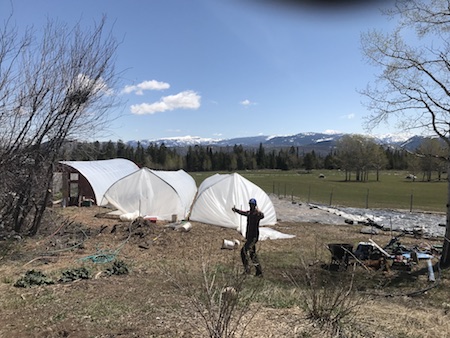 Huidekoper Ranch is a 1-acre farm in Wilson, WY, that produces organically grown salad greens, tomatoes, root vegetables, and microgreens. They received a $3,400 grant to purchase two gothic-style caterpillar tunnels to help extend their growing season and increase food production, as well as adding cover crops into the rotation to increase soil health.
Huidekoper Ranch is a 1-acre farm in Wilson, WY, that produces organically grown salad greens, tomatoes, root vegetables, and microgreens. They received a $3,400 grant to purchase two gothic-style caterpillar tunnels to help extend their growing season and increase food production, as well as adding cover crops into the rotation to increase soil health.
Despite having an extra-cold spring, Huidekoper was able to purchase, install, and plant their first crops in the two caterpillar tunnels. The tunnels allowed them to grow additional summer crops, like cucumbers, summer squash, zucchini, and peas, which, due to their short season, aren’t commonly grown locally. The tunnels also allowed them to grow consistent fall crops of salad greens and root vegetables. Additionally, having their fall crops in the tunnels freed up space in their other beds for fall cover crop plantings. Owner Brent Tyc said, “Overall, this project was a huge success for us! These tunnels are going to be an integral part of our operation going forward, and I don’t see how we could operate here without them.”
Sisterland Farms
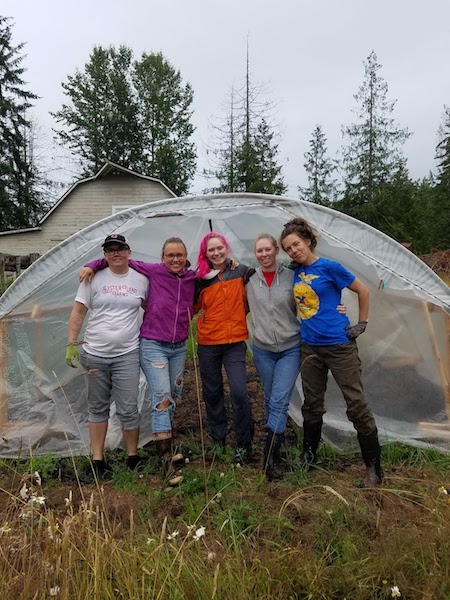 Sisterland Farms, a 2-acre, woman-owned and trans person–operated farm in Port Angeles, WA, produces fruit, vegetables, and flowers, which they sell through a CSA and farmers markets. They received a $3,541 grant to plant cover crops, start a community composting program, install rain barrels, create perennial hedgerows, and grow a food forest.
Sisterland Farms, a 2-acre, woman-owned and trans person–operated farm in Port Angeles, WA, produces fruit, vegetables, and flowers, which they sell through a CSA and farmers markets. They received a $3,541 grant to plant cover crops, start a community composting program, install rain barrels, create perennial hedgerows, and grow a food forest.
Their community composting program was an immediate success! It has helped Sisterland Farms and their local community grow. According to co-owner A. Jenson, “Our composting program set off a chain of events that led us to hold elected seats on the county Solid Waste Advisory Committee, Farmer’s Market Board, and Conservation District.” Additionally, Sisterland was able to install a large cistern, rather than rain barrels, to provide water for their crops. Unfortunately, their trees and plants arrived too late to get them planted this season, but they’ll be ready to go for 2020.
Funks Grove Heritage Fruits & Grains
 Funks Grove Heritage Fruits & Grains is a 9-acre farm in McLean, IL, that produces small grains and fruit, while fostering a community grounded in compassion, innovation, and education. They received a $2,526.99 grant to create habitats for beneficial insects and animals, by installing 10 bee boxes, four bat boxes, two owl boxes, and two large plots of pollinator plantings.
Funks Grove Heritage Fruits & Grains is a 9-acre farm in McLean, IL, that produces small grains and fruit, while fostering a community grounded in compassion, innovation, and education. They received a $2,526.99 grant to create habitats for beneficial insects and animals, by installing 10 bee boxes, four bat boxes, two owl boxes, and two large plots of pollinator plantings.
This season, Funks Grove was able to purchase 10 bee boxes, six of which were installed, purchase and construct four bat boxes, purchase and install two owl boxes, and plant two 2000-square-foot pollinator plots. They were also able to host a local community college class, in which students learned about the pollinator plantings. Partner Jeff Hake told us, “We will gain real rewards from the ecosystem services provided by increased pollinator and predator activity on our farm, bolstering fruit set in our orchard and reducing pest pressure, making our farm both more profitable and more pleasant to engage with and visit.”
Veterans Employment Base Camp and Organic Garden
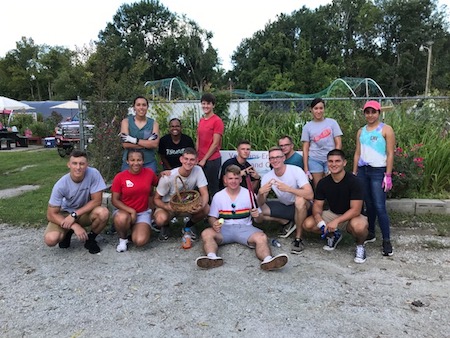 Veteran’s Employment Base Camp and Organic Garden (VEBCOG) is a nonprofit organization designed to reintroduce unemployed, disabled, and homeless veterans back into the workforce as productive, employable individuals. Located in New Bern, NC, VEBCOG uses horticulture therapy to help rehabilitate veterans and grow organic fruits and vegetables to sell at farmers markets and distribute to disabled veterans. They received a $4,400 grant to purchase two Slovenian beehives, which are more accessible to disabled beekeepers.
Veteran’s Employment Base Camp and Organic Garden (VEBCOG) is a nonprofit organization designed to reintroduce unemployed, disabled, and homeless veterans back into the workforce as productive, employable individuals. Located in New Bern, NC, VEBCOG uses horticulture therapy to help rehabilitate veterans and grow organic fruits and vegetables to sell at farmers markets and distribute to disabled veterans. They received a $4,400 grant to purchase two Slovenian beehives, which are more accessible to disabled beekeepers.
VEBCOG’s new beehives have been a success! The innovative design of their two new hives is more accessible to disabled beekeepers, eliminating most of the need for lifting, as well as being moveable, which will enable the beekeepers to transport them, if their area floods as it has in previous seasons. They’ve been able to add beekeeping to their programming and increased their annual workshops from five to 10. Executive Director Lovay Wallace Singleton also told us that the hives “…will potentially increase the program sustainability income from $4000.00 to $6000.00, through selling “Veteran Honey” and beeswax items at our farmers market. These exciting new items will be produced in 2020/21.”
JSM Organics
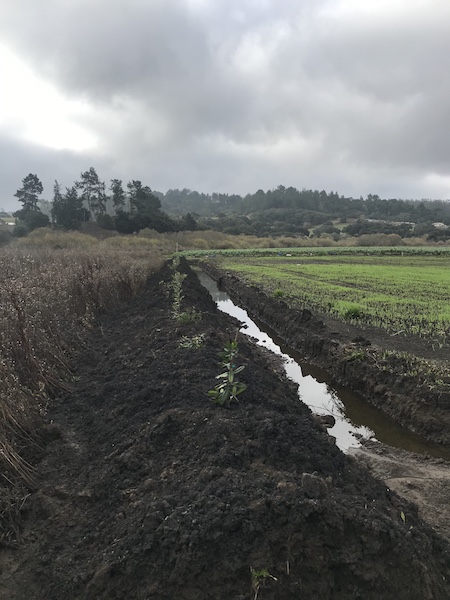 JSM Organics, a 60-acre farm in Aromas, CA, grows organic vegetables, cut flowers, strawberries, raspberries, and blackberries. They received a $5000 grant to purchase a beneficial seed mix, pyro-weeder, beekeeping equipment, a quick-cut greens harvester, and a low-energy greens dryer.
JSM Organics, a 60-acre farm in Aromas, CA, grows organic vegetables, cut flowers, strawberries, raspberries, and blackberries. They received a $5000 grant to purchase a beneficial seed mix, pyro-weeder, beekeeping equipment, a quick-cut greens harvester, and a low-energy greens dryer.
According to grower Javier Zamora, “all the these additons have been a huge success.” They also completed a hedgerow project which will help sequester carbon and provide habitat for beneficial insects.
Are you a small farm or agricultural nonprofit in the U.S. with a sustainability project that could use some funding? Want to be a FruitGuys Community Fund grantee? We’re already accepting letters of intent for the 2020 grant cycle. Not a farmer but still want to pitch in? Consider donating to our Give & Grow Good 2020 Campaign or volunteering for our Annual Grant Review committee. Your help directly supports small farms and their communities. For more info, visit: fruitguyscommunityfund.org/get-involved




